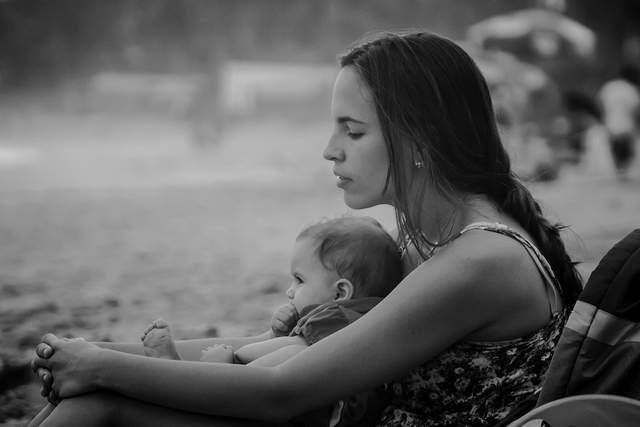My cultural pride is shame.
My native tongue is a memory I try to scrape clean so mud doesn’t cake out of my mouth.
My greatest gift of maternal love is to insist she get no heirloom. My gift is to break the cycle.
And what I give her is something I didn’t own as a child.
Safety.
Comfort.
Responsiveness.
Love.
Attachment.
I am not a child-girl-victim.
I’m a mother-woman-adult.
OK, I am, and will always be, both.
(This is an except from “Little Girl Riding Shotgun in My Psyche,” a chapter in the book Trigger Points: Abuse Survivors Experiences of Parenting)
There’s been so little in the way of resources for us ‘break-the-cycle’ parents. Almost nothing helpful, practical, educational or mindful.
Where are the well-written memoirs by survivor parents? The meditation handbooks for handling post-traumatic stress and post-partum depression at the same time? The mommy and me yoga classes with poses on how to manage flashbacks while potty training or medication withdrawal issues in pregnancy?
Most of us figure these things out on our own or with a partner, best friend or therapist. We are silent about the harder parts.
It’s been hard to find other parents at playgroup to talk about these issues with even though they too can keep parents up at night.
It’s hard to talk about two vulnerable subjects.
Parenting.
Childhood abuse.
But we all know shame breeds pain.
It’s important to be able to share.
We need support to be break-the-cycle parents.
Dawn Daum and Joyelle Brandt are two women who created what they craved. They made an anthology of essays, from women and men, all survivors of childhood abuse, parenting kids of different ages. Brandt read an article Daum had written in 2014 entitled Raising a Girl as a Survivor.
She didn’t know Daum but wrote her directly anyhow. She shared what Daum’s words meant to her and wondered if she’d be willing to collaborate on an entire book.
Immediately, Dawn dove in with daring and said yes. She too needed support, community and other parents.
She too had been frustrated by the lack of information available. Both had looked online and in bookstores.
There’s so little even today on so many topics such as:
- Parenting as a survivor
- Parent triggers
- Break-the-cycle parenting
- Support for parents who had abusive childhoods
There was nothing to, for and by survivor parents in the way of essays, resources and journal prompts.
That can be said no more.
‘Trigger Points: Abuse Survivors Experience of Parenting’ is now available.
Within it, we parent-survivor-writers got to share about parenting without a road map, without a default setting we can lean into, rely on and be supported by. We wrote about creating new patterns, traditions and ways of being, responding, emoting and interacting. And how this is done while breaking the cycle of abuse, neglect and dysfunction.
It’s nice to know others have been there or “get it” and are doing the same work. It’s nice not only to be in a groundbreaking book but to be part of a survivor parent community. Daum and Brandt have not only found each other, but hundreds and hundreds of others. We can connect and communicate and share resources.
We can converse with one another directly via the Trigger Points Anthology Facebook page which grows daily. I’m so grateful to have this resource to support my mothering. I’ve craved it for over a decade.
Finally, there are survivors coming out and writing openly and honestly about life as a survivor: parenting, work, balancing home and post-traumatic stress — even if it’s still new and rare. Finally, we can hear others struggle with if, when and how to share our history with our own children. We can discuss what is age appropriate, necessary, helpful or hurtful and hear from others living the same questions and experiences.
Our families of origin may be in the lives of our children a little or a lot and how we navigate that reality and keep our children and ourselves safe is crucial.
It’s hard to believe there’s been so little resources to date.
There aren’t a lot of articles on if,when and how to tell your kid “Mommy has PTSD” or “Grampy isn’t safe ” and why. In fact, there are more resources for talking to your child about terrorism than a parent’s trauma history. Guess which one is more likely to directly impact a child’s life?
Survivors have a reputation of being obsessed with the past. We aren’t. We are obsessed with the present and how to raise our children. We want to limit the far reach of the past, prune back trauma and dysfunction so our children have space to grow and bloom.
Plus, there’s so much beauty about the parenting experience and that too is wonderful to share. Often, we are joy-filled and triumphant and eager to share our celebratory experiences and surprises.
We witness our children being confident, expressive and feeling safe. We experience giving and receiving unconditional love. We learn to provide a secure base and find we are competent, loving and more healed than we had realized.
Too often there is no place for us to speak about our ordinary day-to-day highs or lows.
But this is changing.
We are starting to share how it feels to learn what we didn’t experience enough of: attachment, attunement, security and good nutrition.
We discuss effective ways to set boundaries, identify and regulate and talk about emotions or deal with post-traumatic stress symptoms so our children get the parenting they deserve. That we also deserved but didn’t get.
Many of us survivor parents have stopped looking for or asking for resources and are instead creating them. For ourselves and with one another.
We are no longer hiding. We are speaking up and out, for ourselves and to one another. We are speaking about daily parenting not only in therapy or as pathology but just as a part of our lives.
We work to keep our children from knowing the place we came from. It’s called breaking the cycle and it’s often difficult. Grueling and daunting even.
But our children deserve to be and feel safe and loved and fed and cared about. As did we.
We can’t change the past but we can make a better present.
And it’s far easier in the company of truth-telling parents sharing real-life struggles, stories, resources and support.
~
Relephant:
Overcoming Abuse: The Last Time I Tell This Story.
~
Author: Cissy White
Editor: Sarah Kolkka
Images: JN/Flickr and KlausBalzano/Flickr
%%









Read 6 comments and reply